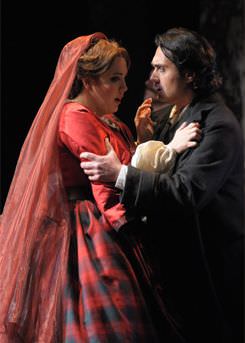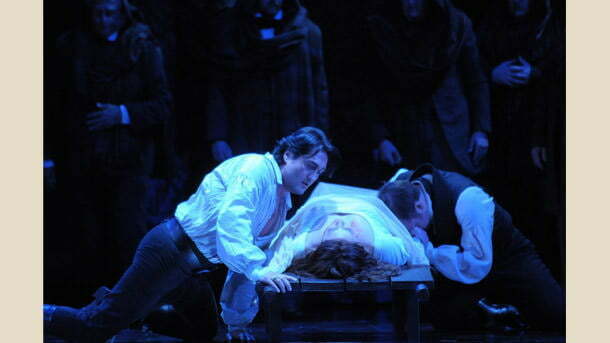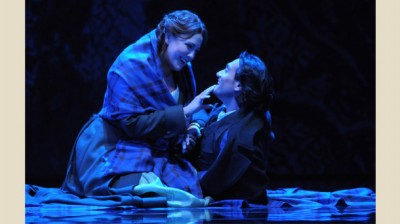Lucia di Lammermoor
Composed by Gaetano Donizetti
Libretto by Salvatore Cammarano
Based on Sir Walter Scott’s The Bride of Lammermoor
Conducted by Massimo Zanetti
Directed by Catherine Malfitano
At the Lyric Opera, Chicago in a New Production
And thou art dead, as young and fair as aught of mortal birth
 British Romanticism was contagious in the 19th Century, infecting the whole of Europe with the bug of Byron. Italy was no exception, as the interest in the far-off and mystical land of Scotland shows. Lucia di Lammermoor, based on a novel by Sir Walter Scott, presents a fantastical story of ghostly visions and deception and love and madness. And Gaetano Donizetti delivers a masterful work of not only beautiful but moving and interesting music as well. True, much of the music is not exactly cerebral – it is somewhat tried and true; but there are some brilliant developments and the “mad scene” contains some of the most cerebral music I have ever heard.
British Romanticism was contagious in the 19th Century, infecting the whole of Europe with the bug of Byron. Italy was no exception, as the interest in the far-off and mystical land of Scotland shows. Lucia di Lammermoor, based on a novel by Sir Walter Scott, presents a fantastical story of ghostly visions and deception and love and madness. And Gaetano Donizetti delivers a masterful work of not only beautiful but moving and interesting music as well. True, much of the music is not exactly cerebral – it is somewhat tried and true; but there are some brilliant developments and the “mad scene” contains some of the most cerebral music I have ever heard.
As mentioned above, the tale of the opera is based, roughly, on The Bride of Lammermoor; with some adjustment: instead of a deceitful mother, Lucy (Italianized Lucia and sung by soprano Susanna Phillips) has the whims and ambitions of her brother Enrico (baritone Brian Mulligan) to contend with; who, in order to save the family name, has betrothed her to Arturo Bucklaw (René Barbera), a nobleman with enough clout to drag the family out of the mire it’s sunken into. However, Lucia has fallen in love with Edgardo (tenor Giuseppe Filianoti); Edgar’s family was killed and forced out of their home by Lucy’s, and he has sworn to have vengeance on her brother. As one would imagine, this makes for a difficult familial situation.
The story is a beautiful, romantic tragedy of doomed ardor and society’s restraints on the unbridled nature of love. The music matches this. Donizetti’s score is superb; he expresses the emotions of the characters with great dexterity.  The duet between the lovers, Verranno a te sull’aure, in which they promise themselves to each other eternally, is lush and lovely yet veers into the melancholy and vitriolic when Edgardo proposes to bring their love into the open and ask Enrico for Lucia’s hand in marriage. She pleads with him not to. Her brother still holds intemperate hate for Edgardo’s family, which in turn sets Edgardo into a rage in which he tells Lucia that he has left his vow of vengeance unfulfilled, but that could change at any time. The famous sextet when Edgardo crashes the wedding between Lucia and Arturo, Chi mi frena in tal momento?, is rich with countermelody and contrappunto, the polyphony not just musical but emotional, with six people expressing themselves deeply and strikingly. When Lucia loses her mind, Il dolce suono…Ardon gli incensi is an absolutely astounding representation of madness in music. Pardon the plebeian expression, but it is mind blowing. And Susanna Phillips absolutely brings it home. A superlative performance, to any eyes. The tenor’s closing number, Tu che a Dio spiegasti l’ali is also remarkable, not only musically but in its restraint. Opera is known for extravagant death scenes where a character is stabbed and then sings for ten minutes; Donizetti uses this expectation to his advantage, making the cabaletta mirror a true death more closely – a solo cello does much of the melodic work as the piece goes on, Edgardo’s breath and life slowly slipping away. This may seem stilted on paper, but it actually translates to the stage. It’s remarkable.
The duet between the lovers, Verranno a te sull’aure, in which they promise themselves to each other eternally, is lush and lovely yet veers into the melancholy and vitriolic when Edgardo proposes to bring their love into the open and ask Enrico for Lucia’s hand in marriage. She pleads with him not to. Her brother still holds intemperate hate for Edgardo’s family, which in turn sets Edgardo into a rage in which he tells Lucia that he has left his vow of vengeance unfulfilled, but that could change at any time. The famous sextet when Edgardo crashes the wedding between Lucia and Arturo, Chi mi frena in tal momento?, is rich with countermelody and contrappunto, the polyphony not just musical but emotional, with six people expressing themselves deeply and strikingly. When Lucia loses her mind, Il dolce suono…Ardon gli incensi is an absolutely astounding representation of madness in music. Pardon the plebeian expression, but it is mind blowing. And Susanna Phillips absolutely brings it home. A superlative performance, to any eyes. The tenor’s closing number, Tu che a Dio spiegasti l’ali is also remarkable, not only musically but in its restraint. Opera is known for extravagant death scenes where a character is stabbed and then sings for ten minutes; Donizetti uses this expectation to his advantage, making the cabaletta mirror a true death more closely – a solo cello does much of the melodic work as the piece goes on, Edgardo’s breath and life slowly slipping away. This may seem stilted on paper, but it actually translates to the stage. It’s remarkable.
The sets are generally simple, but that’s anything but a criticism. They are beautifully painted, and elegant in their minimalism. With one exception: Wolf’s Crag, the castle around and in which several scenes take place, is intricate, beautiful, functional, and overall masterfully designed. The costumes are excellent, with the subtle colors in the designs playing important roles. My only complaint is the supertitles, which, from time to time, were left wanting. For example, in the sextet, only two voices were actually translated. This does not affect the enjoyment of the music itself, but leaves the story slightly less fleshed-out than it could be. Still, that is a fairly minor caveat. Generally, this is the Lyric Opera doing a classic at their best.
Highly Recommended
Will Fink
Reviewed on 10.13.11
For full show information, visit TheatreInChicago.
At the Lyric Opera, 20 N. Wacker Drive, Chicago, IL; call 312-332-2244, www.lyricopera.org; tickets $33-$194, through November 5, 2011. Running time is 3 hours.

